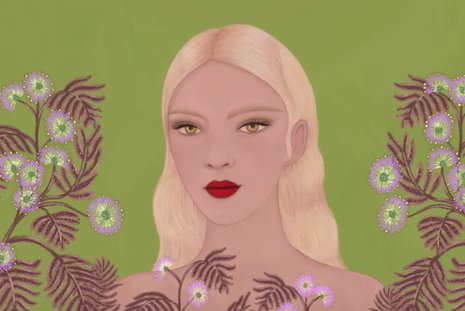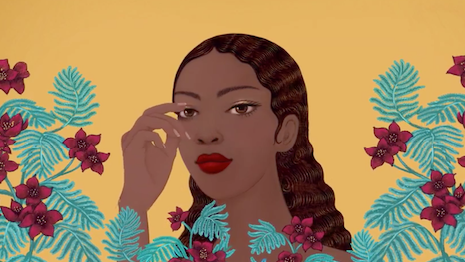Italian fashion house Gucci is bringing new beauty tutorials to life in an artistic campaign, highlighting its most accessible products at a time when consumers are seeking small luxuries.
British artist Alex Merry has illustrated new looks created by Gucci Beauty global makeup artist Thomas De Kluyber. The illustrated video tutorials highlight how consumers may achieve more looks using various products from the Gucci Beauty collections.
“Gucci is not afraid to go outside of the norm, and this campaign certainly fits that mold,” said Kristy Engels, president of Beauty Strategy Group, Orange County. “It works beautifully within the current collection and storytelling they are doing for the brand.”
Ms. Engels is not affiliated with Gucci but agreed to comment as an industry expert.
Illustrating Gucci
After largely keeping its makeup line off social media since its launch in 2014, Gucci emphasized its beauty division with a dedicated Instagram launch in 2018.
The debut spotlighted important works of art to exhibit Gucci’s creative director’s unique idea of beauty (see story). Now the brand continues in its artistic efforts by commissioning the work of Alex Merry for its newest beauty push.
 The videos advise consumers on how to apply different Gucci Beauty products. Image credit: Gucci
The videos advise consumers on how to apply different Gucci Beauty products. Image credit: Gucci
A full-time illustrator based in Gloucestershire, Ms. Merry graduated from University of the West of England with a first class B.A. honors degree in illustration.
She has collaborated with Gucci previously on decor, garden and mural campaigns.
Through Mr. Merry’s illustrated videos, the new Gucci Beauty campaign shows consumers how to powder their skin using Poudre De Beauté Mat Naturel to lock in foundation, focusing around the sides of the nose, forehead and cheeks.
The illustrated women complete their looks using various Gucci Beauty products, such as: Sérum de Beauté primer, Fluide De Beauté foundation, Crayon Definition Sourcils eyebrow pencil, L’Obscur mascara and Rouge à Lèvres lipstick.
While the brand is notorious for its culturally relevant and creative campaigns, Gucci could be missing a critical sales opportunity with this illustrated beauty demonstration.
“From a technological perspective, I think [the videos] might be slowing down the page load speed time,” Ms. Engels said. “It takes way too long for the product pages to come up when you click on them, and why are there no ‘shop now’ links for the powder compacts used?
“It does not deliver much of a consumer benefit in terms of what the product textures are like, how they actually blend into the skin and what results you can realistically expect.”
Gucci has been ramping up efforts around its beauty offerings after relaunching in 2019 with a lipstick line (see story). The brand expanded its cosmetics offerings with the launch of liquid foundations and primers late last year (see story).
Earlier this month, Gucci Beauty launched on Alibaba’s Tmall Luxury Pavilion, connecting products with more than 770 million Chinese consumers on the digital platform (see story).
Road to digital beauty
With stores shut down for extended periods of time, beauty brands have worked to overcome many hurdles in digitizing the shopping experience.
Beauty group Estée Lauder Companies has embraced a variety of omnichannel tactics, from virtual consultations to Postmates deliveries, to bringing the cosmetics counter to shoppers’ homes. Taking advantage of in-store inventory, the company turned closed stores into micro-fulfillment, using Postmates messengers to deliver products to nearby customers who were waiting for their orders.
Estée Lauder also pivoted to virtual selling by enlisting previous in-store staff members to participate in Zoom parties, live chats, FaceTime consultations or other virtual events (see story).
LVMH-owned beauty retailer Sephora and French beauty brand L’Oréal have utilized social selling platform Replika Software, allowing brands to leverage both store associates and consumers as peer-to-peer influencers, “social sellers.” Founded in 2016, the platform was inspired by an observation that consumers were visiting stores less and getting inspiration from social media.
For instance, at L’Oréal salons, stylists can use Replika to suggest products to their clients and retrieve transactional data (see story).
“Luxury brands are meant to convey exclusivity, a feeling of being in a special club or inner circle,” Ms. Engels said. “That environment can be extended to the digital space with private zoom events, exclusive chat rooms and private member groups to give the customer the exclusivity and access to information they crave."
{"ct":"8Nssh9+mAQSfEe0JUz6vOww7ois9EoqWGQr0OecUN\/PNw++aDhzflbR1HSYNWgsnw85mhQaOTwdRJerxCw6GAGIHDNKdOiDagmJlhFgGtEZN22h3O8RCw21ldcjym6fpIqW7b6QUUoIOW1wxNSYkKBpWWVuMeNOrQXUbnfUMil7KA9Gcvum5btow8f3k0R\/kNJTCMmZyaWWOiPMlzDorfKs+g9xq91IQ3jfIvnPtofMnwExvz7QsGI9nGfa47VqIPd28H6N2MUWyfIwpsT8mWcsf9bfbAEeBN5S8iZPhOrZh\/+nWGmdHge7mYgFHRD39tzOiFVfDeO52GDGws9Y7gHQoJvUJYksquFJmrnwYEq4mo+oqmkWhelLrAvh+nnOMuilLo\/dXRWHOJfIogZc+wS64v5NVLDnSRzu8FAEbY2H44SVrEZiDYU0IWZcREg7\/TN8mIm6bC2vTeHNz5\/BTDwmwfJr5yxs38DgVJtvTIygnSkL3VfuTzWKtMtW0h8l8blQHbNliNzlvTJ8iKCwMRyuHy84I0NqeiynAegEG6pl8576X2ahP28uykOuF7+gy0En8rQrARUW0nvlR7Ht\/FavPA6ZXQyilh1+NIViJxSkuuVdpbXkRNJ9njeLvFeP\/CfYjJq\/rxAa+5C8s\/AvzTYOxHZIkBzXVC0iVniz0llMsONFSLKt+MZTMXrJ3mM5JGu2jZLbgRHaA9Sgxh7laDAduTk6hzKHO9HAfJRRsEahAuRZ+PnYHkld1AAXFcIlNfg5wkZ7AzCPSeIg9rg6vZUWSKhObN4JMmXBzP5SuKquq6apJU\/mOQ28lQI6FMx0JqpxypmlxKMaImXfK9IFT+5sSraFaQ7F4g6xC4h4pfIFxxbEXjqgqbxpl78OH8IzwUWNyEJxCnBl6j+drDOotRhfu\/2dSY6yZWNaR7HDy9v212hQTAiZ0GnWiP4l1UFedZMTUNjrUYPadyztEdFxvxkUZzHwmN3LQR6vpcK1EyOCkxNkbqUmOfvvO50P6j5w1clV6DiaZ5u9RE9hTK6pqGBZGOv9Q3pC9HWVEC3EsLctbeRah0OipWrn2N3XmDsIhPVzXNLj9PJZUAcp3sN4o2QD2WdT3S71zcmB0kDOiwJE5YR\/HuZU5LhYaj8Yhj5zV4SDp\/P5sFK\/tC4zJKosPzc9DkyOWvTJwLVI\/YUJ9hYV30E6\/ktr46\/5Je\/yUazoNbgTqM+82rliYWhw4\/qpkNSQ1kKLcoPMYD0DUyU2r8VQEEUE8Ovk\/9tRK6D6mhFuy0l5EU+3wkQCQa241iub8p2YVsOS1yO1mdNBPTWMDjbcxzjW+0epAPLDGvzmjrVIMK4ktS+cD2ync9+RvWLfPU1yBCsCiym1SQPTZRo0ZxOBzzY1vH9iXQynJ8\/NmAMeGJrFt1WqSpbX0OKPNb+YQilLtWh8kyXy97HXCSz0hYDYshwyDAE\/6S3kAZEovqPmJx3A2WeCwCGVexhfLrMq1hQhACDypPF3yJfG72Nw9vBznhW7eglzbE7O1wppS70VlSmJlFMABO9Ae3znkrOllG+Rrgzik8FGS54XPuE4QjkzJ6wSU6Gs5rgOcKjtD7oz1PDxvEdwKcyRx3k8FxYP+I\/U8IpP+CrwbGYQas4ptIU0t\/eouxZ+2GKWoYT\/z\/6C1fo1X\/xrVVbN31pv9xIukyXA6Jw+U+LQvxQOeui9s4fprnz5pETZ261Wj5+XJd5+J4QCQLMCu+uCRV3YGZ\/TXHGEj+WTL6rOYhwIgDzH0AVHpyl6CgpDnOOOz1H2ajAAe7FoA7Scw7pSCYaJe2oMA6UmSRAoQ1GxZ9zkZm1MUIYs\/XKFkMh1HigdWstqRniEBM97\/MrBTGkgaTo5AtwW+uQBvD3ESaPw4X+aWsN94KzEI2sE+GCT00135NELJtT3ERfrQd1SdjgFjARym+ozqbwCqlmBtvI5MMZCeYlkj6uMPDxWhfkKivXuy74WtGbcqBOAqZFTuvEKi7adamN55+MVx3MlK9E+o2R+asi9YaX0yTU\/MXO1OFeJ8AuPsk9bGFanAO\/axDIXDMqBkSUGJEIHxYZKXFq8SW1Ncl3KQHNl70MlSu8LThk\/8w8\/nYdwvMC5l7nXIBFGoGM6XTyQ1PftAVw3JVKX0DOd0ftVN+5J6+\/l6q7tLRrVZQtZ09ZLjGqT10CA9CiwrC2xpAuxHCfzkVfG+dwd+Uf3px9uA6onEC+H3mlYOKunR8cvBZhINFUKqxCyaxX1N8aPNfzrK+PW6+dk5v4UMwy9xS2ScAc+DgmQOVltdTe+qow36V9g1FWbN88xaRKhi14Y4bKJN\/1ETdblJUA6lHf8kiUb8F2W2WP\/K3QlKSmTPGh5RB7YV9R8\/VdobYInv9Snt3VsnAunm9fbd1UeJ4Z7VAw6vF\/BKTkmITuI8zP8XjTBXBtx4IJxkTEBrITWX1IlC02gbcRAPyOiHK6qHCb39StZ4xZ1KWem0CeAxWyxdRithcAeZns5jPrhmcBMiJqvnlcV+2BVjLHnzq9P6m9\/ulbELAd\/Kb18MkOFb0soYWKWvc8A6rRU2SqDAAYmesh+0v\/Atkip84P6KWIBcoKssY4QJKXRpGHtvggsm838Ur4Hc6L5MBV14U9UToQEoW9zWR2YDnmO92fImxswX80jZ1UG+JD7gafGHVPCV98g\/XFZ6qj+1dreiNBm6zZ0bYQwz0fScSNMOwtLsdAftZAHNX0gDg+yt\/WRDd7v1aaVvhxot\/Qg3MbBTht83mezDAz2oq+efy4vBLS+VZ\/mjXigxXYDL4Qy1odTBEck6XS3RlbKXc1FayzxnQyX6WLCKywEwDf9ItzLHqu8FY8jZpTMGwO3D9IKxDDGUA7DX94HNwo7iqpX5gZwD+7xQaJIs9HAOQEZUyaCIER\/Wyon+7x3MHcBfpiuVsB7FWrfEJ80NOjdemDMl9gelwuvyykgaez7qV\/Zgaa7kzny9outVhjXP3lG9ysC8hq9EA8H8krwK95cpmv00ziy6KzDzluxDbgMP6h4psjyGZzvlZ+UCDSYMZRavoAWwbVct8RFOdlqn2BkSoE18NNEfTEbpvGDfcZPGtBUiHhl+6HT6C0wYXbQT5i43gh2s5mXl9yK9b\/sPJoyfQM8Ev30IJUWnvAITSlMLSYGF0xXtsyZ+BUSRBPpUXlYmJl4rvrAsB0F311yxuldxtW3KD1JLQmjrijqIGCP9xJY2vtnM8y7b+z5ztO1MkDxbbOXxu0n4p3kIUebPNWEteUmU6PiQsuwyfvK7wcxpZqPF1Hckwkn6sRsgEaR1bbjpkwA95PnjI\/\/RlY6Vk6DRak2CMS2lPBSfTqoLyNbxvAzWTFKzJWsmQfrOfWmd9ETpbKVJ\/gOchOkkWUlidDVSXDhah+U6pgD38hwX9YDlAVI791wlSAxLbc76ThbVHMfAxipzquUEwG7FSLjQcxFGRIpIQqB468qb+Mj9cBxFxmROe6+J3QDq7F6fSZw4x4Df6t1ul1fMpQOK3is31wa1VeTdFoL8ZbEFHT5r4Qdj2WSyR5ZvjfBc6\/FPR47\/ncvP9CFqhMDmT\/6k75WeiAXGSly05CQgRjxd\/ExWu\/1fxoB8kddRrtvGd9cE57X02JTUonjmauZw56QjFRE97z0T4+HyAlFZ23W08e9xJjmPMksZBFsfCfMimvp9irXSWMBUsSm\/CvaEbf3nD++iP00OeedDE2NaHM7M5VqC0KHZ9OfvULvHIEVbVMHyRgqw5Z9x5nBHln9RZvciF0ma+rmaeXLhLIrnpzvuKaqPIbjFPvoG9o2PCipwJqQqwORU+jV9kVJolVK6eso7KVeRjscrgmJW5L+wDhy\/dDBwsXRfTAivYew8tgBGKjl1UNhZzuySiBaQbfKhCn5qWv8y5KTdX\/lkgGEICphN7SFk6jaQA2SJ8e\/t+lTxkRi3Taz2Xbg4wwBNrpks8nVXqqWsUUflTo3vjChGmFSKfKcMjGAwaW5hq7KcwadGAOGDJ20cLeE70KfYItu1e\/nsloAzSNshhyvfF8eQhke0QwUc6av\/hlSiGDUeDQZxu1r\/5bjtFtqv4iaVxnW+DPtUzUWba5vspZWfLEWuzKW8uE9lSbYTtrCKtkg8\/807V2XJz8aNa1+vIKKraIgelBsKcQip7RUIZICXyZLBwWBGir7jCPTAMeROLO606bCdWa\/lgl0uyto0ePyxpO+2SeWYGUfbSdNMu0xs5WcZ2swoE02SKaiZv+XdnQWXvyWivqExtZwFG4VDQwKJylbJJ9soB3eGfmSvBAaTmIyGgE7RWFAYdFYJcOHb35SozWzXrzm5Tsxrenrz9D+gnzZO8qC6VPL3UdOlRh9hiUkJDQfUJPS1VyUP1H66i\/squAH3MnuxCIwKj2ofVEDA7FEqnwkSYHZy6npQalqv7wId0ZVDSuL4RdD7TgcsSAuPhv27KI3qqFlt0Xrzrog784w05lu9RJQwytj2F6YoZcv8GjzAsZH\/MQdlT3wfzGyM8AsJrb4gVFwh5XH4jdpYhq1y2VizhvkcunPsRRfxRdwVJC1XXutJwcnmuPSgDPotHTsZ75qPUCoTMENPR6K0bDso8O+Yxgdo\/nG8zojtXVggp\/cc0wT8HvEYJ6Jl7ZOEfNYJVK11bY9Kfo6m7VzWHbuQBYYkysKYNcBw9kMpjtH\/LTmUVXUxidogyOkrMXSlCLRFI5N0MWTWgTrmlmUiDZT6e6f0VFsJjXr9zuLc3oo+ZLwm0ry4Kd\/Ay9byBCYQJljAd7E+zyEvOmAMJJfNJD+7IL\/vMXDgtG6Xb7iUVLk3ueo1R4pQ5VRLLN5RMsop7qhOuKP7HBMqhFkxi8PSNLx9jo2VvdsYzngi\/WCSpgA3aYwVadGPRldmykJlEyMaZ+qgJpPe8pYYD+StU7I9uaBVsz4brUfq795GQ\/AWrGzINTfD6s0t4\/hBISANB\/bocLx0pdbj\/xVDEE\/GctMB7frvb3KM8+qGGuYSYBMTyqf7bXplSS0d8XOAtSj4OzC7WhlfE0SYyjYUQe3o8qczSYpE34U52TuqyxYY3jKnjT3pmGUqUimCjSY\/OMp8C7su3arXOepc4\/CB+eEhKzog\/SR4DjP+y4d1Gkg7dDNsToHiDPaQEW2sVcB2tdonBnHidLYzIKhKgcr81TpK8d9ndqcv7HcHZz97WTXhKAoBygjufvV6Xbs6\/oHqdNIrNt83HHPEjECjxK5+gK2zXUA2monW6I37UvwwhUyeF0IPSpHOdAJh9GuTrawB46VdzcfG3FrmMUWNP+A25by1ZmctzWAAWknt4tpcZMqXIYmfReawkXKLJZ9k\/OGgDy0g8UK+T3fFwsHLHiO0u5+LCiBJsowrCMydtokdfdXSxibDEnZe2Kr+b12tbLDA2\/GPVSGhslnoGs5b3j01IupVqmDVgy5w6TZTysTH\/2cK+\/6tRsioLBiRYUCxWcgC7aPXDMJzwo8cYBh0grdVhxKjiV9D13jnVhlO3MyUnUEKjHVOtJgz2MR5DLOXfnQrQMSszBSY9vbXtDSf54QxhM3paUiid\/4vFuyqtyUov42oLhvY78zVI6e4h2D22RAWTtydCp8ruQkHo\/lLvtgD\/Kv3t4x7O94+HyfBBhxLtUUJEcFTPCiOwEC9ZZmEAeOVp1eXvjZWfWPhHDk15Eckh6Wu7Y7jSR4eMa\/1XjK0v2C3kKcJQMsyLTQ44vFRUv9lyMQbrioB\/JAAyLzMJvq3IjVxLvQuOOgw+PR67XCe0VXM0WDBDW7nNZKkuBQswFYwO21vpVKascGQxOpeNd\/Ug2aC\/h8SUBY3VZRnBDO6aXKggPCoH3W23vOVAfYFP5MaHCV5N5b1jPZIz8ZszulxJvNaRYFFOGCJ48Uq\/EEOoMAgJGg2VQ3xDmHWNP78jkPBrc4J82b4d1kVfI0SoWjZwmP739OE\/Puip3pazrGo1DmJuThpsyuJFdjyZt7GFSfkoW1+27KbecgsMId0ZX49V8i3iK\/kK9ebOcHNd+TO5fNKmvbZVhcfiY9tC6uNMwZsL9YG8OTBjERuPMMkH2GXbre4M1mkaM30uF2XBvdjz7gqhRdOVBy3b+JiuVuLp\/wuWsgG68X7Dzu8l4jDujUnejFdZVpgGW4lS05xTxOeNwWHwPQ5MfNRu\/dspYAcjXvYTVIrR+jNURlRYjSC\/kSpjb46ftAoF+\/DWzbofI1SG49gKskW+cHHHvjvomEJQszDXQ7TeE9JENXXlLhhafVt\/UT9UM6cI57XlMfMUInAkrM4POd1JLGXTr7IljVBIlIui1soYAd4Bzo3StrhmiuEqx6oB7Y04JNqdwruzU27uQoghnk02VoNdD8T7YBQ5\/d4zYzZef+tG8f48sf77l4jTA8rcaUKnY3KrNntQeQXGxfMpGTd1WN6dbbyQDX2iTZxoJOEFJJpZ1adiV8Awo62L\/ayn3c+WPr4QNAAf2E8kaHpQw\/zB28nWH+eiX9HUuZNUKM\/BjDYQgjFJIxLKDFUMvmj7Mng0ZxcLfd26V+ZnsDwI+QzYNZjzkon2gW2wQMJkTeMGF84GE5b6RJjqO3cMy\/ZufuvGdjZKJd9XrllHUK+mCIEEQtU0kQNn6JauUkJzMNgCyW2T5PhDLuQtNyNdwAX8olkDfxlezdcxX4HNK8Mj3UeunYcW47OgryN3wVtSQzGRBf6VpTtl0KrBhwfj+xiehcHc6kauluyATDI5yZqWk38eO1SfpdivjcJ4hhTNIN3FqhkKfh4Y\/2xfxr7A5dg4jdKwR9ThpaC6ePRoQRhY2Yje0yh0fXQaKxRcMzPi12M5IRjxCUNkGDAaIDFvd55Lm5wZmQIyCWGiW\/YuahkgOF5CaaKPf3PehCo0LArpnJ+5TbqhHZUvMn5Ro6KzwPRRchCVZrUiCn63u6VjwmyEPexn7+Pige3eJfNn9cy2vr7ltjJ+w2FBDLXLPePb8Qo2PP0JCOHOnwiJCqu9IOzC9g4T2tsG0vZxNpqpd6PwyZ9JgE5ZDaZR9+uUQ2LUoS\/QMY0oEssajIBBqphdpdwrltu5qA+F00fXP11RtGoJqK3hlHLOEmDktaW3JGKZMRlLt8GDkxwZEKJW7trrRBgZ8xpfxDZhXKW8NEFn4KIv2H3fPSUqCeUXqkvCwv0XDhfcwgP8A1NG8\/wQ30ag439A2DnSHSP8mFVRo94iu3r0YlInFLGDpVC0e\/OFgUGieI\/oN5+aL+aouaQmJQAgme2CuOCMJ\/4ic6IKiBYd2l3YCk4WvfOdsBjloPgqSNiddjckwuXWYyUZmdqSL9pDNDU3QLschRxMUvSg4740QgmHJDF5vNxXzYxDCI7qbMgbwqgiOacuTpjn2zlHV6gc2zajyLqX4ArUSe3sPABpEJiQwggj2hNlyAlaEuywh129qqqvy576WXYEyZeVu6BxMjyrxqk58Om5KTNf3ZLzxet4Q0vntJyIxgA7a1Yv0jzRye7POaOp0aryWGl3bkrhaeFjdQbsupVC0OFpb2TqxSd3fe9aGrWvXGgCnyh1E4CXZIgtd4s0PRts1nBDxKLAl13X8QSzCC++BrgDZbzkRtRqWJW0xzbuq7BBe1DwcU1d3BicEQ86tfHoRq4AYOQTdz\/BSk07BDpQbUYbmdH84F5YRPHlGtydIXwO9QlNTOJTWiWVhMm7xqmDvaCurSTe62QO8mocC2iwhQpnWGHWdCYE153eD+vN9gGRmfPuVRUTNyw\/JHuzc5XCCF1NQzhuy6frUlq\/M27f5PgZD\/0lafJMeO3rx09tqK9IpXeFzoF5Fel2l\/9oU5LznfzrXdNf+tuAPwxNR6cZw6ts\/ZoJEWMIxwEGiqLbMz\/Hp+w5tyaR5WygecfjoBApsLjGuJ0eNmr3JFY6Q0MKL5XbmxfUmipJcSjep\/xSUXsQ1YfO1qoze8ix7voSw\/R3SV4175g+h2Vo3nWZHiDgJDkJiduCDywlCvQmpENP8mkvjfsR5LZEoPnRal6dRPvWjEh+vXxk1kdewPRVbOyCy6XalbCAqjGKGanv4uDpROfSFiL\/mk3Kar6yM9hqt0TaCWQQmPPFTjlJLXqtt\/jDEsFAauZ0\/ARK0rMHBXLS5EIbL9SZ6pNcPTqr2bOOmUq\/e2m6yGJP3CHkPxXBmNwIQowco\/K76W\/6FTn2VMYUa4T8VXafkJ6NPVo\/gg3trhgisFIs23rnxlbg5YHTaAlML4e4WCQwyjz7c8osHU626QQiQorwjYh4cu1mMMgy2FgVU5NXBTINPOz9j6Z3KzNRtWiDYKptaZzcZRMbZo7qyScgMjQwhmqsC0P0Bu+sDDgq9tB9j7cdf9d1xPhpX82y2T1eS7Bw58aWjZF5FQQKKdKUM17ptTvxxFiaViAhmssD6cKLVnwpDeQa3+Cu0LVqXMjfVE1j\/uLRXsLZczsmctqdcWkfbW08QYHYVgdqcAeltWqXgMs2ugiNFFHTEUfN2Jh6StmkcjnZ5xZ8uvBynjSty1X53GHeUNCoLVDuwA3l3PqlrnWHZjZhxx3Xv0Dr6CkmMFSMA\/DdgfE7whWYPPWAzZoW+R6XJnN9jQQDrLKZrhUdpdgLtsUJTxWLcxZEOv9kZkklm9FXvVS1Roz\/TD0e0OpVBxE8SzeKh+TxIFOzB4hjQpENdFoH20WizzwBmsCQfdcgu7UDC4zofhBvOLPvPzF0Pywy+Hylkjbc2eXtAIijdd3RGcbY8uDtTlHbqh9BcVDaOWpkW2UTyxrEMnJy1kCPy7Ys3kYw74cXisXB1vze0BBnmv3kLOB92uZcWaSBFK2mBG9aTin5gpMUJxu8pJ5U23KWWEoBuz\/GulpaiiWA5RUD77Hjx+r1bM9xXcEGRP1W67fvDdXA7URD5bKmPXuz93OvCuuCRLRnYmP87DzHa6+xkQoU62UcofgJnFvnYbKeF21ek62JiLrvrbxBY8MAy3jI8lyEO+ZByj6f0YDi0EkiyPUOxd5xgBrAz3gyWwfOd54cS3fGJDoAWg29X+wVXilq\/JVFjlts50L1jr3G5GjZ5OGnRvp4k4okvLsHNt0uGWcL4atGg+f+zabd21BJtV+jid1bOrkTPIkndjwVDhzEVhOoo3uBXIlwXM6rB0ISObf8ZxqhTf6gqvJizuJ8IeSwVT7S+58w7l90SWW2YTIJNE7geZv9k2hAZuSWyGc12C0DoQmTf2Y9kkAHUsnAFTcD0tQUKPFAafIS16f\/VWvd3n+CldCpl2Ud07oVCJmQEkGhmCostzXfMTFzvwd4OZ+smHH0LsVuOMAFswPvImk4imvQfo\/RmytVDpvD3FS7hTjrB+d9iwqGiwYMHFpEaA\/iVfpeUYCPCKa5v7diK92iIqNsBif3LZ3sMtxmrOvc\/cSazjDQLh2XSS0w7EyPhbx6VnA62hfov\/ZcoTsuq3O6nFX\/LI3fJNPgMH9wOnKVaqZigqsrZKNKkxE2\/nzTF28+Y48KkgBVwBzSjWkFUdu+XKna63EbMSjytIZjx4+FQgtZAeUNqPG\/LCKTpoDhDXrmGWhMveWDTuObUvzD7Rxuo3ZBXxGpEQ5Z14Dhvov0dEGBB\/A1RmXU\/FSKzqIwhI7jKjA13IFdKGQYALmSGSylbKChALtcc2dPtWuUAIiErlhpk7o7Da4POzPv6YyYYlmjr28lChZH0f4CZKym8ezuA6t7okGiGGdBDH7+ruL2k5CHXF9Ev7hfzbVA25P657CClG8bp6Wizqu\/iDeh1lio\/u9iuCEdGckSXpg23MPzFuMLhqaHuQ1xyM9W9J4Dp0\/XkC6rhETvPGnFMv++mMSmw3H6bxVB93N9K0NoAodxUcujZzywAcwcL2pQxYP4XMYVUMz2U4QcTKvl53t5m+XpBUIJ6MiVvCIH3pZKs1dc8rHKi\/R3lfDE\/\/qqZMar2qpcpLXXJWU\/dnhUAPgE0oEi92Vplg7b+IlFDnJqrWRWJEQfnD58DUZtFtdxsCdsdABpSmQ+DtfQYCUehqcDKW2ikwfzvr5\/c+JTlhwfz4CMP7iJ91vlN2F0ngBloPQrdQICmvl1uI7AE+HtzFztQ2kMjT5WuHcnHEjjrz2R1bAzvrdUe3oamvVAJPVNQuKdaZkG4ZaY4SZw4YrtFTzzuS89GfrgeSHo5vOsapfj0909q4HYeQIc7bNO6I38AZuYeFdnVRlXmvbTlOiu9Fi2llTNQAHwVsvRkvOTWTlgnof\/OZJWX7HubGo1pVtSJnoPwQEkHsKiGDxZyElcO+pOPusTl7BsuCKrAANafhBab7S89TaKkmiWOkEeTJACYCyYqQNInvrCRcmoVRdSRRd6O1k0aXAt7J8Wvi3OyE99Gwein6XjmQ1\/DGywOQtVh65rdfMADsSNqqFwH7c2k1ugf8yo2fNjCaMoHKZymqNvGpReoCds9g9wBS0p4UJt1EBUUnDlCPAhFNz5EhmK1R5T0N8vgznYU7PQzO+2z9OMRyNBPVulxv4PZ7alZEsiV9AQuJsHd0oD0\/pFdN\/6vTXVdKerWfQR+faNInobYwqNbWCxqWacgiC63o4oyfWIRn1X46oIv2zfRs+1\/7IhCErxmJIU9zFZW42OXJexEJWIJ8Ea8ICc+P6olT+oCqxfwl5eE1GNTl7WO0WMqzmVMmL0w5uQgAlOKaZ2SJ\/mWfKz3qnW8OL3vY+cf+PATkRQqjGKtjOqaPaYD1q8t\/Ku0+Ncb4v\/yegGqKgakxGknhyRlMqkfxOuVgHOB3yBy4u40iuklEdN1yUnzgt1+2rE0hlYsk2oWkt1SuhfmREM5jLzkg0q\/l0x2UnoVzuU7TgXMzrjDXHPXIWZT0tT0eAYqUvSW6BbZYSTmWbxcT\/4BavC+NoJIK4hXcGUs43o+e9XqChL8AiXGDozYV3PTnUJ2AXrq40Nk2E1tFQoaHr+1ZODTx2+FCRs7hl7sRXOf7M72okzKjHJTF5TpjvFU6sowoP3a3Rm6INuh9HP\/0lWlrtxNBsZwhIatsxwFP\/5m8W6QmsJHzP838zLKpO8XRyCitP5A2fQ5Y+xbDSp2RNC8X6mCXIWPMSBz3rt+63WWnO5UcD2DiclmCiEuk=","iv":"8ed62aaf6ac14c61a3f4ee5043c3cc10","s":"fc9e5f87034eaa5e"}

 Illustrated tutorials are the focus of Gucci Beauty’s newest campaign. Image credit: Gucci
Illustrated tutorials are the focus of Gucci Beauty’s newest campaign. Image credit: Gucci  The videos advise consumers on how to apply different Gucci Beauty products. Image credit: Gucci
The videos advise consumers on how to apply different Gucci Beauty products. Image credit: Gucci